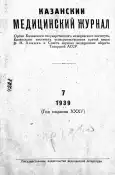The effect of suggestion on appetite
- Authors: Berlyand S.G.1, Levin S.L.1
-
Affiliations:
- Leningrad Medical Institute named after Academician Pavlov
- Issue: Vol 35, No 7 (1939)
- Pages: 22-29
- Section: Theoretical and clinical medicine
- Submitted: 04.06.2024
- Accepted: 04.06.2024
- Published: 08.06.1939
- URL: https://kazanmedjournal.ru/kazanmedj/article/view/633166
- DOI: https://doi.org/10.17816/KMJ633166
- ID: 633166
Cite item
Abstract
The doctrine of higher nervous activity, developed by the school of I. P. Pavlov, made it possible to study the problem of so-called appetite using a purely objective, physiological method - namely, the method of secretory conditioned reflexes. In application to humans, this method was developed at the school of prof. N.I. Krasnogorsky, and a whole series of data was obtained that are essential for elucidating the nervous regulation of the food instinct and its diverse manifestations.
Full Text
About the authors
S. G. Berlyand
Leningrad Medical Institute named after Academician Pavlov
Author for correspondence.
Email: info@eco-vector.com
pediatric clinic and laboratory of higher nervous activity
Russian Federation, LeningradS. L. Levin
Leningrad Medical Institute named after Academician Pavlov
Email: info@eco-vector.com
pediatric clinic and laboratory of higher nervous activity
Russian Federation, LeningradReferences
- Павлов, Лекции о работе больших полушарий головного мозга, ОГИЗ, 1924 г.—
- Красногорский, Развитие учения о физиологической деятельности мозга у детей, Медгиз, 1935 г.,
- Махтингер, Физиол. журнал СССР, т. XVI, вып. 3.
- Берлянд, Влияние алкалоидов на безусловную секрецию у детей, рукопись.
- Левин и Петрова, Клиническая медицина, № 6, 1938 г.
- Левин и Эголинский, Физиол. журнал СССР, т. XX, вып. 6. Там же литературный указатель.
- Левин, Сов. врач. газ., № 1, 1934 г.
- Платонов, Слово как физиологическ. и лечебный фактор, Г.И.У. 1930 г.
Supplementary files






